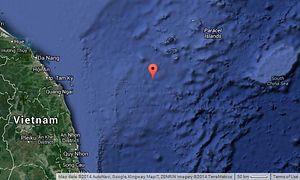Carl Thayer, Flashpoints‘ resident South China Sea expert, took a look at the reasons China might have preemptively withdrawn its oil rig from South China Sea waters disputed with Vietnam. Thayer paints a compelling picture of the multifaceted strategic environment that led Beijing to pull out its oil rig HYSY-981, which it installed in early May. The diplomatic crisis that followed drove a wedge between Vietnam and China. For Vietnam — particularly the China skeptics within the country — the episode vindicated years of mistrust of Beijing. For China, as Thayer argues, an early withdrawal of the oil rig at this point represents a face-saving resolution to the crisis — Beijing can now move to repair relations with Vietnam.
The HYSY-981 episode may have rendered Vietnam more of a wild card state in the U.S.-China competition in the Asia-Pacific than it has ever been. Traditionally, party-to-party solidarity between the communist parties of both Vietnam and China has kept the Sino-Vietnamese bilateral a relatively stable feature in the region. The United States, which established diplomatic relations with Vietnam just 19 years ago, has slowly been expanding its relationship with Hanoi. The HYSY-981 crisis between China and Vietnam represents an important overture for Washington in Southeast Asia. If capitalized, the United States could add an important ally in the region and continue to have more friends along the Asia-Pacific rimland than does China.
As Thayer rightly highlights, Vietnam’s domestic political situation is not monolithically in support of generally good ties with China (crises such as HYSY-981 notwithstanding). In actuality, the Vietnamese Communist Party is split between more conservative pro-China elements and pragmatic national interest types. It is the latter group that favors closer ties with the United States over China at this point. Even if Beijing succeeds in some diplomatic patchwork with Hanoi at this point and restores bilateral ties to the point where business can go on as usual, it will be no easy feat to disabuse Vietnam’s China skeptics of their strategic mistrust. Thayer notes the disposition of these types within Vietnam’s political machine:
Other members of the party view national interests as more important than socialist ideology. They view Vietnam’s hierarchy of foreign relationships that puts China on the top as a “comprehensive strategic cooperative partner” as in tatters. They note that the United States, a mere “comprehensive partner” has done more to support Vietnam’s sovereignty than Russia, listed second in the hierarchy as a comprehensive strategic partner.
All of this suggests that the overture at this point should come from the Vietnamese side. Indeed, it already has to an extent. An entire year ago, long before any of this oil rig business, Vietnamese Prime Minister Nguyen Tan Dung used the 2013 Shangri-La Dialogue to call for a greater U.S. role in moderating regional tensions in the South China Sea. “No regional country would oppose the strategic engagement of extra-regional powers if such engagement aims to enhance cooperation for peace, stability and development. We attach special importance to the roles played by a vigorously rising China and by the United States — a Pacific power,” noted Dung, emphasizing the legitimacy of U.S. influence in the Pacific.
The actual state of military cooperation between the United States and Vietnam is slowly burgeoning. U.S. ships have made port calls to Vietnamese military facilities, including Da Nang and Cam Ranh Bay. This sort of interaction between the militaries of the two countries has been ongoing since 2007. Obstacles remain, however: the United States maintains an embargo on lethal military equipment to Vietnam. Still, especially outside of military matters, there are still plenty of areas of cooperation. The Trans-Pacific Partnership (TPP), for example, represents a particularly promising avenue by which Vietnam could mitigate the risk of economic abandonment by China should it swing full-steam into an alliance with the United States. The TPP would grant Vietnam preferential trade access with 11 other countries along the Pacific Rim, a potentially major economic boon.
The United States, however, should not merely be content to win Vietnam’s allegiance due to China’s provocations. It should instead demonstrate value to the Vietnamese government. The best way to do this is to wean Vietnam off its economic reliance on China. The TPP is a great way to do this, but the United States could have a major impact on its own. Bilateral trade between the two countries stood at over $20 billion in 2012, representing “a thirteen fold increase since the United States extended “normal trade relations” (NTR) treatment to Vietnam in 2001.” However abrasive China may have been in recent months, it will be difficult to convince Vietnam to abandon its most important bilateral partner without material incentives on top of strategic and geopolitical ones.
A broader strategic rapprochement between the U.S. and Vietnam would surely upset China which under Xi Jinping is keen to establish a security order in Asia that excludes the United States in the interest of an “Asia for Asians.” But, as John Kerry told Wang Jiechi at the U.S.-China Strategic and Economic Dialogue recently, the U.S. plans to maintain a number of allies in the Asia-Pacific region, despite China’s misgivings. A Global Times column alleges that Vietnam is “dancing between [the] U.S. alliance and Chinese brotherhood,” and that it would be unwise for Vietnam to join the United States in an alliance as Washington “never loses its innate enthusiasm for promoting Western democracy and advocating Western values such as human rights and freedom.” For Vietnam, neither choice was easy prior to the oil rig crisis with China. Prior to this year, an old Vietnamese political saying — “Too close to China and lose the country. Too close to America and lose the party.” — may have held true, but thanks to China’s actions in recent months, Vietnam may find itself losing nothing by banding together with the United States.

































